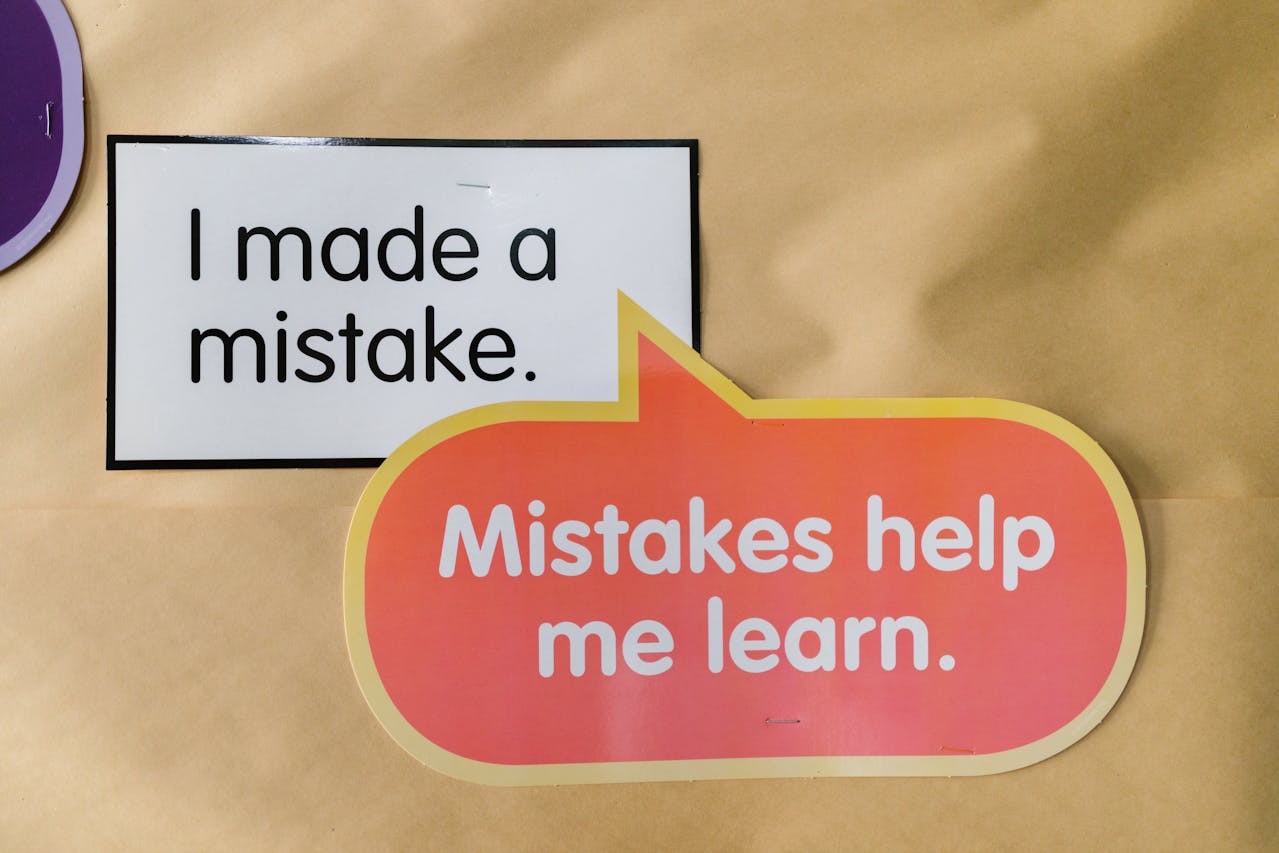Marketing automation sounds like a fancy phrase, but it’s essential for your startup.
Automation is often considered bad for marketing and human resources. It’s not the case, especially when you do it right.
Automating marketing processes and tasks can help your startup improve productivity, generate more leads and sales, boost marketing ROI, and grow your startup at a much faster pace.
You must know the basics of marketing automation, how it works, and what tools you need to use to get it done properly.
This detailed guide covers all of it.
What is Marketing Automation?
Marketing automation refers to the use of tools and apps to perform marketing tasks. It uses an interconnected network of apps and workflows that collectively work together to help you achieve marketing goals – that otherwise – would require a lot of manual, hard work.
For instance, you can use a marketing platform to automate lead scoring and sorting based on certain predefined variables.
The best use of marketing automation is in automating repetitive, routine tasks such as social media scheduling, welcome emails, and analyzing engagement data on social profiles.
Here’s an example of marketing automation at work:
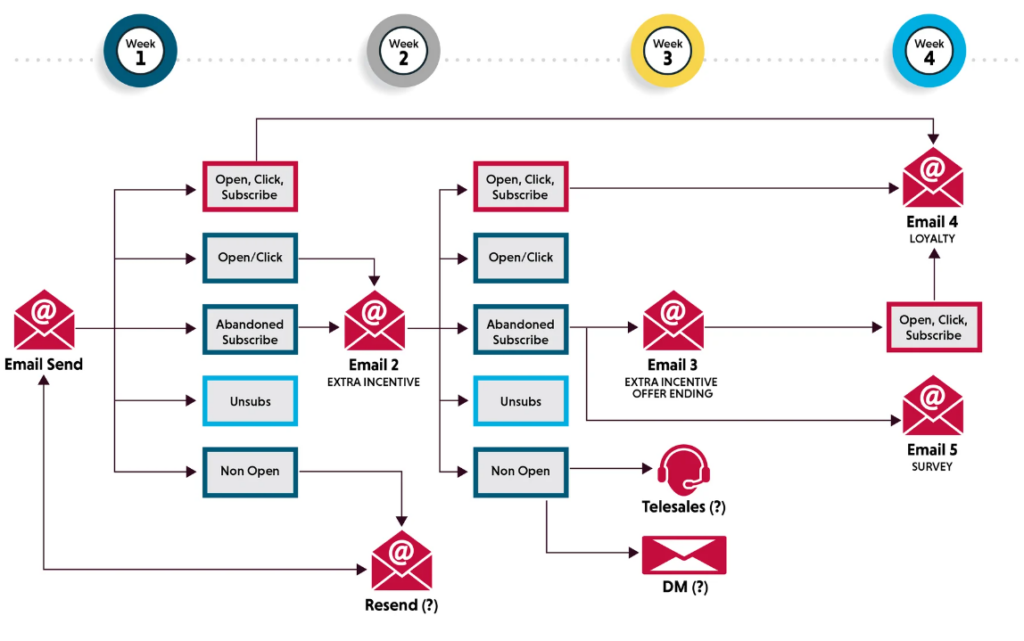
Marketing automation isn’t all about using marketing software to boost your team’s productivity and improve marketing effectiveness. It’s about using apps and platforms smartly by integrating them and creating a centralized marketing system.
Here’s how marketing automation works:
- You identify a marketing process or task that you want to automate
- Identify a relevant marketing app or platform
- Test run the software and see if it really helps you automate the subject task
- Once you have found a functional marketing app, add it to your existing martech stack
- Integrate it with the existing apps you use for your business.
Why Does Your Startup Need Marketing Automation?
Your startup can achieve a lot with proper, effective marketing automation. Here’s a list of the major reasons and benefits why your startup needs to automate its marketing:
Boost Productivity
A study reported that the top benefit of marketing automation is that it saves time by automating repetitive tasks (as reported by 49% of businesses). This eventually leads to higher productivity.

By automating repetitive tasks, your marketing team can focus on more strategic tasks and do more at the same time – leading to higher productivity.
As a startup, it’s crucial to optimize workflows so you can use resources smartly. Most startups struggle with capital and have to work with limited resources and manpower. Use of automation can significantly optimize resources and improve your team’s productivity.
Improve Marketing Effectiveness
Automation enhances marketing effectiveness at all levels.
Of course, the outcome depends on what type of marketing tasks you are automating and how you are automating them. If you use the right marketing tools to conduct routine tasks, marketing effectiveness can skyrocket.
Studies have shown that marketing automation reduces marketing overhead by 12.2% and increases the number of qualified leads by 541%.
In another study, 34% of marketers reported that marketing automation improves lead generation and nurturing:

You can’t ignore effective marketing for your startup, right?
This is what makes automation a must-have for your newly built business.
High ROI
Better marketing leads to higher marketing ROI. Up to 45% of marketers reported that improved marketing efficiency and high ROI as the best outcomes of marketing automation.
Around 80% of marketers in a survey attributed their success to marketing automation, and 44% of businesses see positive ROI in the first 6 months, whereas 79% see results after a year:

Proving ROI and improving it for marketing campaigns is one of the toughest jobs you have to do as a startup founder. Choosing the right marketing tools for automation can help you boost ROI within a year.
Personalization
Personalization in marketing is crucial as your audience expects customized offers and product recommendations. This is one area where automation tools excel in two primary ways:
- By automatically understanding buyer preferences based on past interactions with your brand and recommending the best solution (e.g., recommendation engines)
- By constantly collecting and monitoring data that helps you better understand your audience and their needs.
According to one-third of marketers, more than 50% of their marketing budget is spent on personalization, and in return, 89% of marketers say they see positive ROI for personalized marketing campaigns:
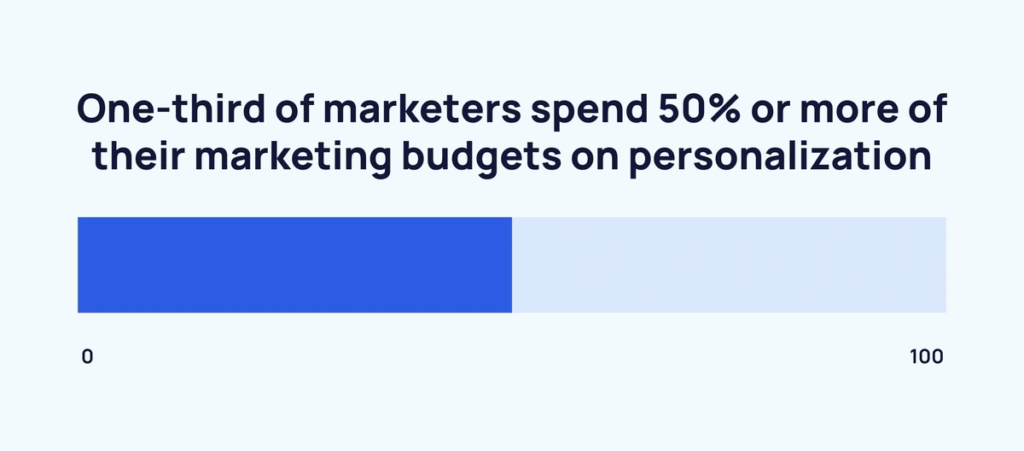
Marketing automation turns out to be the best solution for personalization.
Data
This is the number one reason you should leverage marketing automation.
It creates tons of data for your startup that helps you in decision-making throughout your company. Think of buyer personas, sales channels, touchpoints, customer support, finance, pricing, logistics, and what not. These processes can be optimized if you have data.
You can skip judgment and make data-driven decisions that help your startup grow.
Marketing automation uses apps and tools that generate data. It bypasses manual tasks and converts them into digital tasks and processes. And once a task is performed digitally, you get access to data (which is usually missing from manual work or very hard to compile).
Data makes decision-making easier because you know what works, why it works, what doesn’t work, and so on.
Marketing Automation Tools for Startups
Now that you know the importance (and benefits) of automating marketing for your startup, let’s get to the apps, tools, and platforms that you can use to automate marketing seamlessly:
MailChimp for Email Marketing

MailChimp is one of the leading email marketing platforms that’s ideal for automating email. It is a feature-rich, multipurpose marketing automation app that offers much more than email marketing services.
You can use it to create websites, it lets you create different types of content for your audience and subscribers, and it has a built-in lead generation platform.
The key features include:
- Supports end-to-end email marketing automation
- Marketing automation workflows
- Dynamic content
- Advanced tracking
- Integrates seamlessly with leading apps and platforms
- Landing pages, pop-up forms, and social posting
- Free plan to help you test it out.
MailChimp is a dedicated email marketing tool that lets you create email campaigns and autoresponders at scale. You can create your own workflow to move subscribers between lists as they move along the customer journey.
It offers all the core features your startup needs to automate email marketing.
ManyChat for AI Chatbot
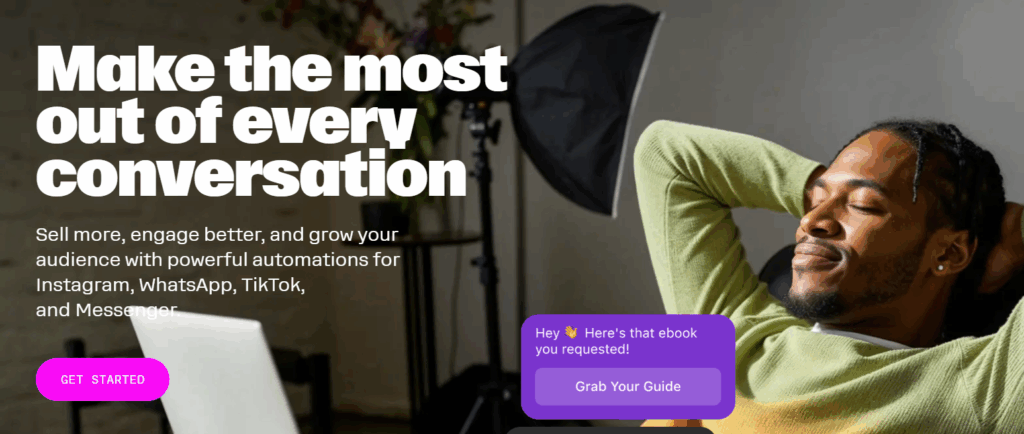
ManyChat is an AI chatbot that helps you connect and engage with your target audience across different touchpoints. You can automate conversations with your customers by creating workflows easily with its drag-and-drop interface.
It supports multiple social media platforms including TikTok, Instagram, Facebook, and WhatsApp along with SMS and email. It supports a live chat feature for your website that makes it a piece of cake to offer live chat support to visitors that works on complete autopilot.
You can use it to directly sell products and services via chat by embedding PayPal or Stripe buy buttons in the chat. This makes it much more than a simple conversation or engagement tool.
It’s an ideal automation tool for startups that lets you engage with your audience, generate leads, and offer proactive, timely customer service across touchpoints. It has a free plan that supports up to 1,000 contacts.
What makes it interesting is that you can use its API to integrate it with existing apps you are using.
Brevo for All-in-One Marketing Automation Solution
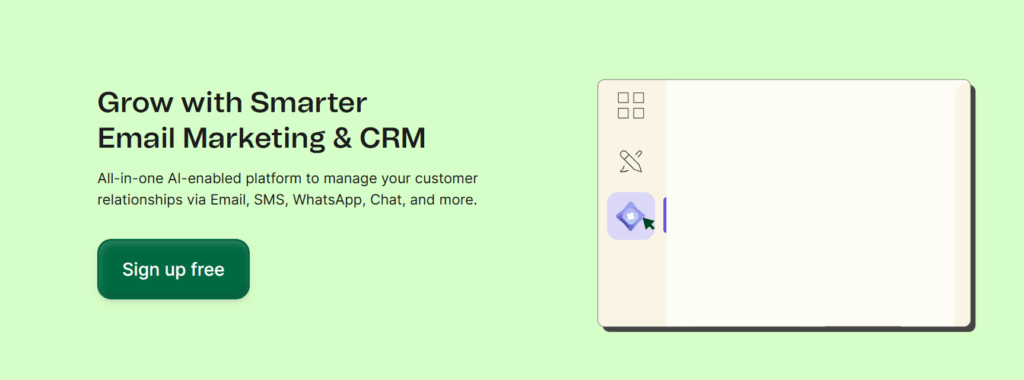
Brevo is a multipurpose, feature-rich automation platform that’s an absolute must for your startup. It heavily relies on AI for the management of customer relationships.
It’s essentially a CRM tool that offers email marketing solution, SMS marketing, a sales platform, and a customer data platform. These multiple advanced features and tools make Brevo a truly all-in-one automation app.
The primary features include:
- It has built-in marketing, sales, conversation, customer data platform, and messaging API
- A chatbot that works as live chat
- Workflow editor and dynamic content
- Sales pipeline and scoring features
- Advanced customer analytics
- Supports email, SMS, and WhatsApp marketing campaigns
- Landing page builder
- A/B testing
- AI content creation tool.
- Free plan that gives you access to all these tools.
Brevo is a great marketing automation tool for startups as it’s easy to use and offers a wide range of features. Instead of using different marketing apps, you can use Brevo to get all the marketing, sales, and CRM features in a single platform.
This makes it an ideal automation tool for startups with limited resources. You can get started with its free plan and see if it’s the right fit.
Ottokit for Workflows

Ottokit is a visual workflow builder that’s coupled with AI features. It’s a truly automated tool that does more than marketing automation.
It covers pretty much everything and has the potential to automate your entire startup.
It works by connecting different apps through its workflow builder. The built-in AI agents monitor your workflows in real-time and trigger on time. The app works like Zapier, and currently it supports more than 1,000 apps and platforms.
You can automate any function, task, or process with ease.
Here’s an example:

It has a WordPress plugin that lets you use it seamlessly on your WordPress website.
However, there’s no free plan and it charges you annually. This makes it a bit pricey for startups, but it is a tool that you can’t skip as it sets the base for marketing automation.
Zapier for Integration
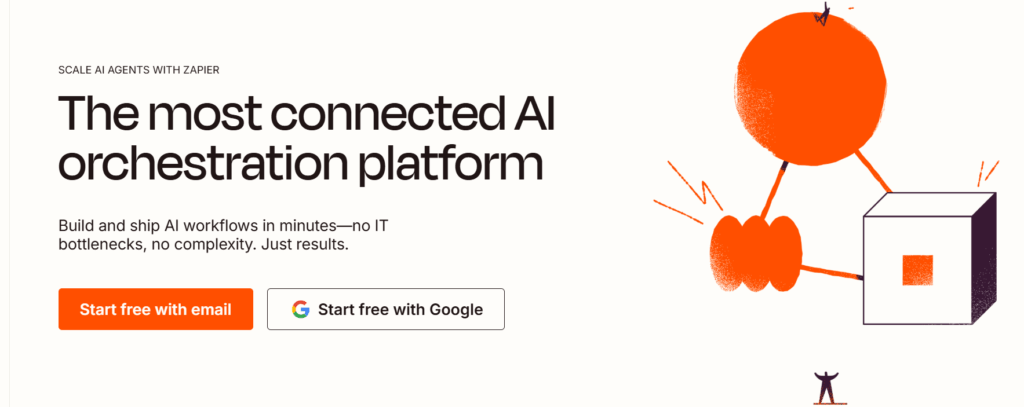
Zapier works like Ottokit. It helps you connect different apps, create workflows, and automate marketing and pretty much every other business process of your startup.
There are a few reasons that make Zapier an ideal solution to integrate different apps you use for your startup (and this doesn’t just include marketing apps, all types of platforms and apps):
- Zapier supports more than 8,000 apps and platforms
- It has a free plan that’s good for your startup
- It offers chatbots and other additional features that support automation.
Zapier lets you connect apps via webhooks. This is where it gets really powerful. You can integrate and connect any platform you are using for your business via Zapier and automate it.
It is much more powerful and advanced than Ottokit.
Ideally, you should choose either Zapier or Ottokit.
Zapier is more suitable for app integration, but it has a learning curve, while Ottokit is much easier and ideal for small teams.
Buffer for Social Media Management
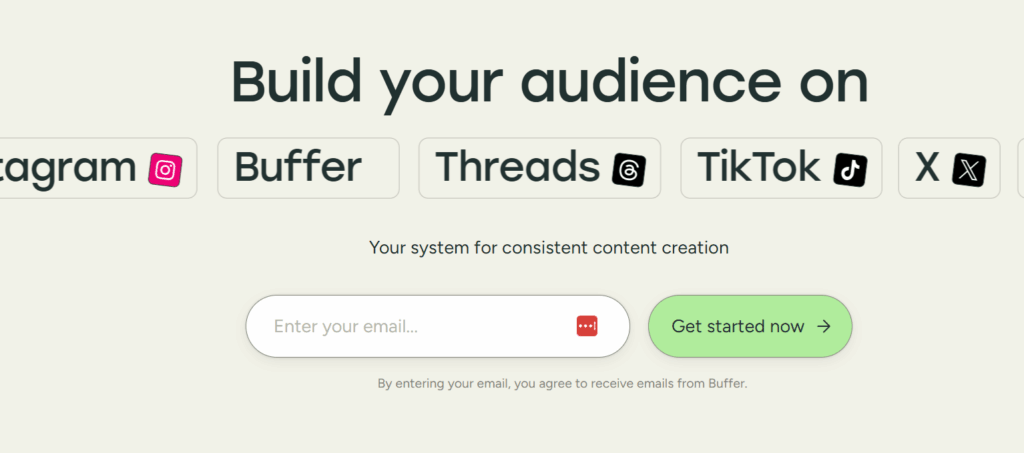
Buffer is a social media management platform that automates publishing for you. It’s a simple, clean marketing tool that is quite handy.
It’s an ideal platform for teams as it supports content creation, collaboration, and approval workflows.
It supports a wide range of social media platforms and lets you manage all of them from a single, user-friendly dashboard.
Instead of visiting individual accounts of each social platform, you can link them with Buffer and add content through it. This saves a lot of time.
On top of that, it provides you with more meaningful insights collectively from all the platforms. This lets you better understand your audience as a whole.
It also lets you create a custom bio page where you can add links to social platforms, website, blog, and other details about your startup.
Buffer has a free plan that lets you use 3 social platforms. You can use it free of cost and manage social media accounts effortlessly on autopilot.
Intercom for Live Chat
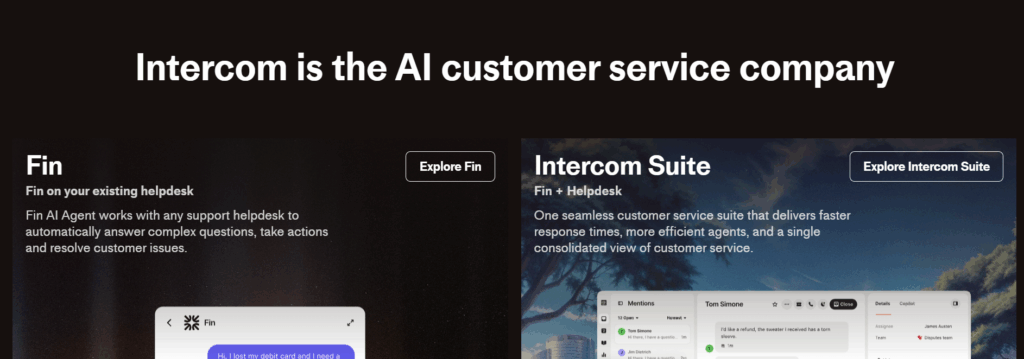
Intercom is a customer support and helpdesk platform. It is not essentially a marketing tool but it’s closely linked to customer service, customer experience, and UX – all of which are directly linked to marketing.
It offers two main platforms:
- An AI agent known as Fin, which you can integrate with your existing customer support platform. Fin is a standalone software
- Helpdesk, along with an AI agent, which is the complete Intercom Suite.
You get a lot of AI-driven features that fully automate your business’s customer service and help you deliver an exceptional UX. It is an ideal marketing automation tool that helps you acquire, engage, and retain customers.
The primary features include:
- End-to-end helpdesk platform
- An AI agent that can be trained and deployed across touchpoints including your website, email, and phone
- Automated ticket resolution
- A help center where your customers can find answers themselves
- Works with more than 450 apps.
You might not need a full suite, but Fin is a great AI agent that you can use on your website to generate leads, answer queries, and help visitors make decisions. You can use it as a marketing agent to promote products and offers.
Since it runs on autopilot, you don’t need a team member to look into it.
The price for Intercom Fin is based on the value it delivers. You pay $0.99 per resolution. If its resolution doesn’t help the visitor, you don’t get charged.
Intercom offers a 90% discount to startups for its complete suite along with free Fin for a year. You need to meet their eligibility criterion and apply online to get free access.
Klaviyo for CRM
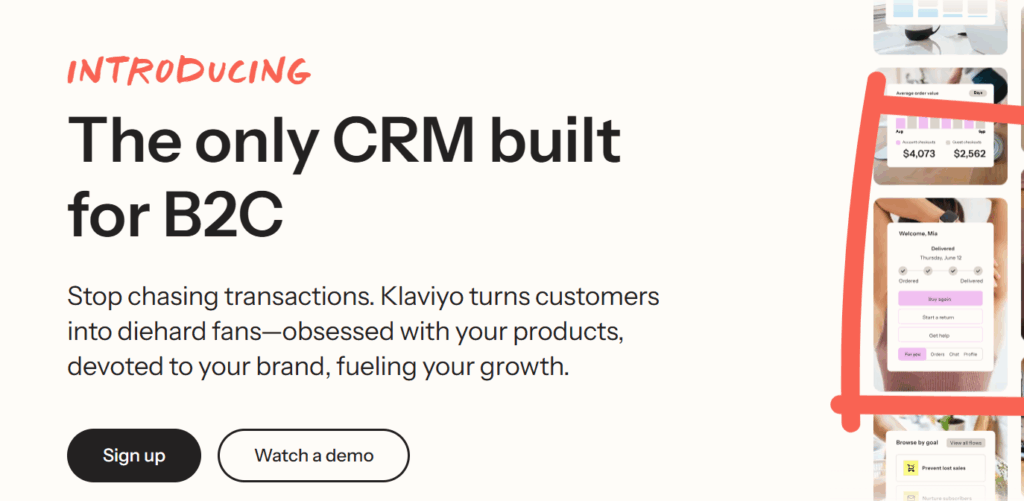
Klaviyo is a CRM for B2C that’s specifically developed for small businesses and startups. It offers a complete CRM platform that offers a wide range of automation features, such as:
- AI content creation for email, SMS, and MMS campaigns
- Omnichannel support
- Advanced auto segmentation of customers
- Built-in integrations for automation
- A/B testing
- Product recommendations to customers based on their preferences and interests
- Automatic development of the customer journey at the individual level.
It’s an all-in-one marketing, customer service, analytics, reviews, omnichannel marketing, and CDP platform. However, all of these tools have their individual costs and are optional. The core CRM platform has a free plan that lets you send emails and SMS to your audience.
If you want to access more tools and advanced features, you’ll have to opt for them and pay additionally for each service and feature.
This eventually costs you a lot.
Price is a major downside of Klaviyo that makes it expensive for startups. You can stick with its free plan and move from there based on your needs and as you scale.
Jasper for Content Writing
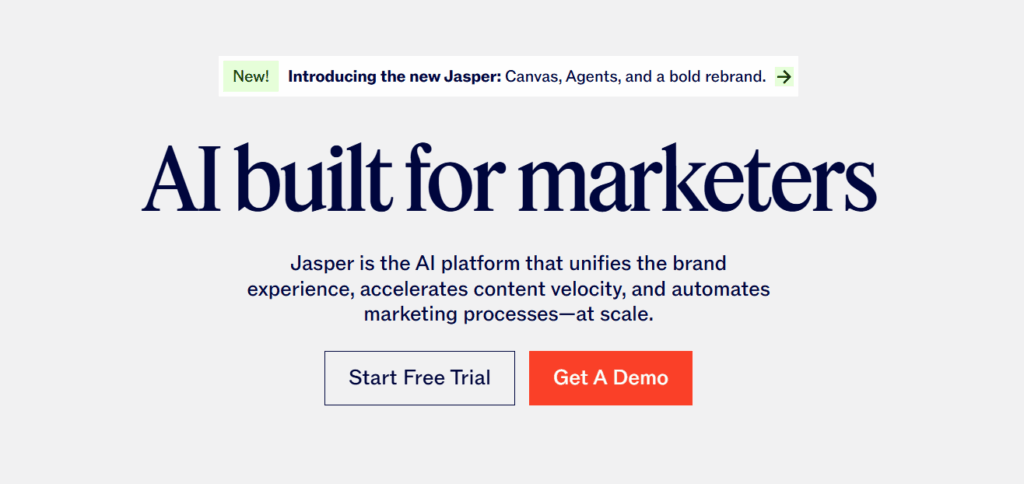
Jasper is an AI content generator that’s an absolute must for marketing automation. It offers multiple tools and features to automate marketing for your startup. These include:
- Canvas that lets you create AI content at scale for all types of marketing campaigns be it blog posts, ads, social media posts, ebooks, sales letters, etc.
- Agents let you create apps and workflows to automate marketing processes
- IQ is where you can analyze data and manage your brand voice and message.
It’s primarily an AI text generator where you can use existing templates to generate content of any type in minutes. For instance, you can use a blog post template to create a blog post, a case study template to create a case study for your business in minutes, and so on.
The interface is easy to use, and it comes loaded with a chat and text editor. You can add your prompts in the editor to tweak output content.
The AI content it generates is decent, but it requires human editing. It does a good job of automating content creation for your startup.
The starting price of Jasper is $49 per month. There’s no free plan to go with, unfortunately.
Marketing Automation Tips and Tricks
Automation tools and apps don’t work on their own, it’s the user who makes the difference. Use the following tips and tricks to get better at marketing automation:
- Start with repetitive tasks: The best way to implement automation is by finding repetitive tasks such as sending welcome emails to new customers or creating social media posts for every new blog post you publish on your company blog. These types of routine tasks that require minimal or no cognitive skills should be your top preference. Identify all such tasks and look for ways to automate each.
- Have a marketing strategy: Marketing automation isn’t a replacement for your marketing strategy, objectives, and goals. You need to have a strategy with well-defined automation goals and where and how marketing automation fits in your overall digital marketing strategy. Using automation tools randomly to automate different marketing tasks with unclear goals has lethal consequences.
- Set rules: Define rules, policies, and SOPs for automation. You should have solid marketing automation governance policies for your business. Have a formal, written document with do’s and don’ts of automation and keep updating it as you move ahead.
- You don’t need a lot of marketing apps for automation: Excess of everything is bad. The same is true for marketing automation apps. In most cases, your existing tools can automate routine tasks for you. Even if you have to buy new software for automation, you generally need just 1-2. More software and tools don’t translate into automation. It can backfire by making tasks and processes complex. Stick with the basics.
- Integrate apps and tools: Irrespective of how many apps and tools you use, you need to make sure they are all connected. If the apps are not integrated, you’ll end up with silos that hurt automation. Connected apps share data, work collectively, and significantly boost productivity.
- Analyze data: Collect and analyze data to improve marketing and automation both. Data analytics gets easier when your marketing apps are connected and work together. You’ll have shared data that’ll make more sense and can be used for decision-making.
- Don’t automate strategic processes: Strategic marketing tasks and those that require cognitive skills should never be automated. For example, choosing the right ad network for your ad campaigns is a strategic decision that shouldn’t be based on a tool’s recommendation. Only tactical tasks should be automated for the best outcome.
- Look for alternatives and free apps: It’s quite challenging for startups to pay hefty subscription fees for automation platforms. Finding alternatives or free alternatives to an automation app you like will show you several relevant tools. You can easily find the free or cheaper ones.
- Keep human supervision intact: Marketing automation doesn’t mean you have to rely 100% on apps. Human supervision is still needed. You should retain your marketing team and provide them with relevant technology so they can use tools to improve their productivity. Apps and software shouldn’t replace your team.
Final Words
Marketing automation isn’t a quick fix and shouldn’t be considered one.
It’s not a shortcut.
It’s a long-term strategy to improve marketing effectiveness at scale.
You still need a robust marketing strategy, campaigns, and manpower along with automation. Marketing automation is a subset of marketing strategy.
Yes, you need to use marketing automation tools to get started with it. The smallest tasks that nobody considers important should be automated like scheduling a social media post.
Don’t expect immediate ROI with marketing automation. Give it at least 6 months to see results.
Get started today and see how marketing automation can help your startup.
Featured Image: Pexels



